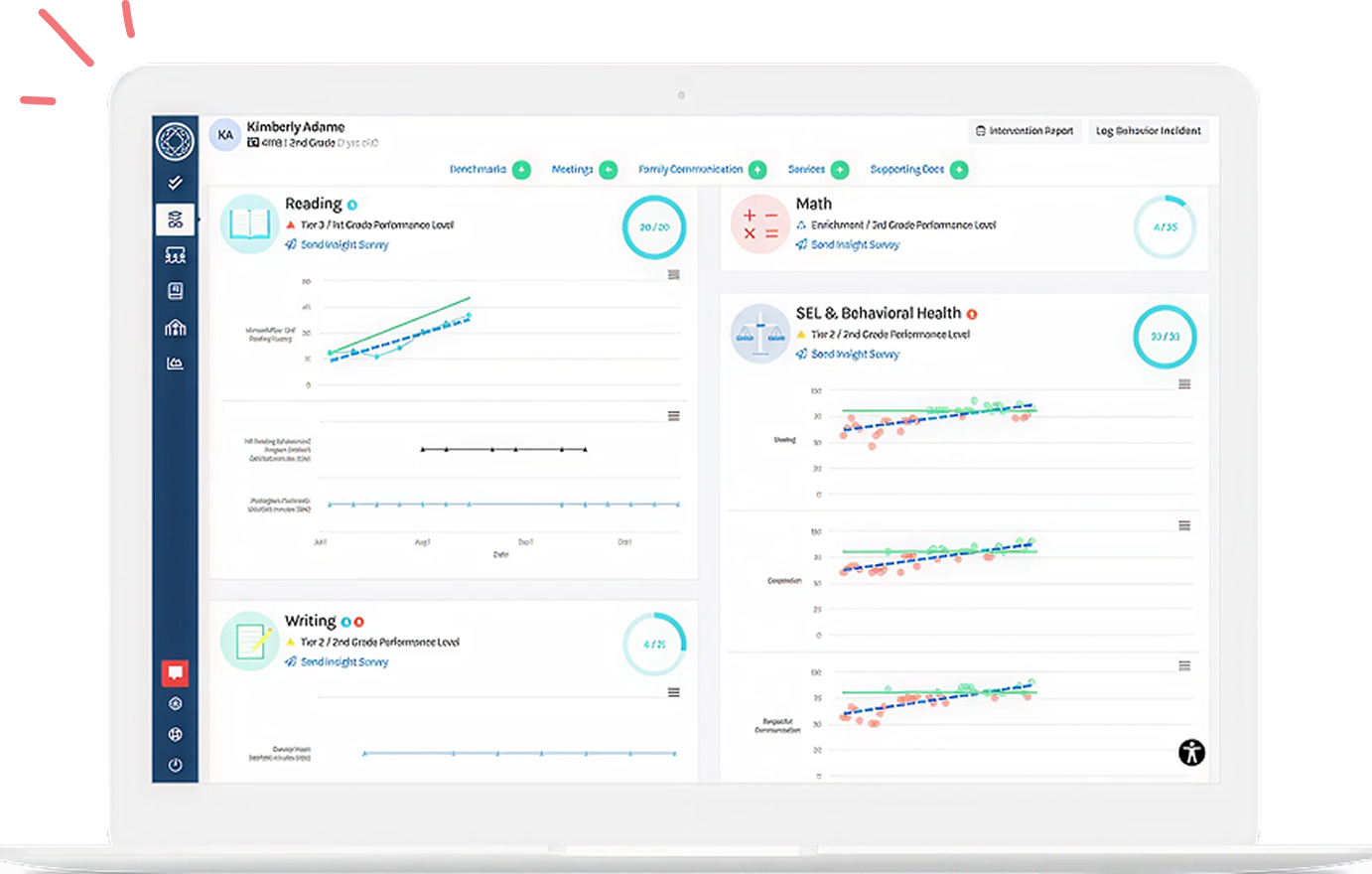In the spring, the world bursts with growth. Plants blossom. Anyone with a yard or garden knows that growth requires patience and perseverance to help the garden become fruitful. From planting the seeds to watering, weeding, and nurturing the plants, countless tasks go into creating a thriving garden. In the same way, tending to your Multi-Tiered System of Supports requires patience, time, and attention to help your practice thrive.
One of the things I try to do today in my role here at Branching Minds, working with districts or the Professional Services team, is to think about how today's decisions will impact our future work. When implementing MTSS, we sometimes wonder whether all the work is actually making an impact. This time of year is the perfect time to take a moment and ask yourself the bigger questions about MTSS and your implementation efforts.
|
Tips for Your MTSS Implementation
|
Questions You Should Ask About Your MTSS Implementation
These questions are in no way exhaustive but are meant to prompt thought and meaningful discussion for you and your team.
Question #1: Is MTSS making a difference?
First, leaders need to ask themselves to look at the MTSS implementation from a 30,000-foot view. Who is impacted by MTSS at the school, student, and teacher levels? Be radically honest and reflect on actual results and who is experiencing a positive impact. Are you heading in the direction that we intended to go? Are there any negative trends occurring?
Question #2: What new behaviors and practices are taking place in my school?
Rightly so, the focus is often on student outcomes, but what about those other stakeholders? Student gains are a lagging indicator. How can you look for earlier success indicators so that you are not 6-9 months before you realize you are off track? Adding measures of success that notice the changes in the instructional practice, data use, and collaborative interactions is critical. Has there been an increase in communication with parents, and can you see and hear an atmosphere of continuous improvement at the school and district levels? MTSS is an organizational structure for identifying needs and delivering support for students, so it is essential to analyze the impact that new adult practices are having.
Question #3: How are we following up on our MTSS Implementation plan? Are we tending to the system with fidelity?
Your success has much to do with how you routinely follow up on your implementation plan. Have you been following it with fidelity? If you have not created an implementation plan, it’s time to make one. You can utilize a plan to formalize your MTSS implementation goals. It’s not just the students who need them, but leaders, teachers, interventionists, and all the adults who contribute to this system. Intentional practices such as those contribute to fidelity to the long-term success of your MTSS implementation.
Just as you want teachers to implement interventions with fidelity, you also want to be tending to the system with fidelity. A great place to start measuring implementation fidelity is to look at your grade level and student support team meetings. Check those agendas and minutes. Sit in and participate in a sampling of those meetings. Check on how many support plans are being created and for whom.
As you examine the different components of the MTSS implementation, ask yourself these questions.
- What are we doing differently with Tier 1 Core Instruction?
- How have we increased our awareness of student needs in core instruction?
- How are we differentiating instruction?
- Are we identifying the kids who need support quickly and accurately?
- Do they have high-quality plans, goals, and progress monitors?
- What other questions are you curious about?
Question #4: What is the evidence that our implementation plan is working?
Not all of your data will be hard evidence, but it is important to ask yourself how you know that change is occurring. Perhaps it is when teachers suddenly talk about data in the teachers' lounge, bring their data to meetings without prompting, seek others’ perspectives on challenges they face, and celebrate small and large victories with students and each other.
You may have heard conversations about continuous improvement in grade-level or committee meetings. These conversations have shifted to those that promote solutions and collaboration, unprompted by leadership, and other stakeholders are taking ownership of the process.
As a leader, you should also know where to find the data that matches your goals. These metrics will help you track your implementation. As an administrator using our platform, you have insight into student learning plans and have visibility into how many students may need plans. It is not enough to cover these ideas in professional development — being present where intervention is happening will provide direct insight.
Question #5: How has my leadership changed?
Lastly, as a leader, you should be asking about your development leaders, who are not immune to making their own “practice” changes during the implementation process. Much is required from school leaders. You should ask if you have become a better leader and how you know you are growing, too.
This question shouldn’t just be asked in isolation, but with your team. A great exercise is asking everyone if and how they have become better teachers, interventionists, principals, or in their roles. This can be a hard question to ask and to answer. It requires vulnerability and honesty about how you might have fallen short of your or others' expectations. Whether you ask this of yourself or your team, this shouldn’t be done in isolation but together. This is a great reflection question about whether your MTSS practice has made you better at your job and whether the system is creating a culture of continuous improvement for everyone, not just students.
Tend to Your MTSS Practice
Just as gardening requires tending, so does MTSS. There are times of hard work, but there are also moments to tend and examine what will help you continue growing. When I got into school administration, I realized early on that not all teaching and not all teachers were created equal, just like the students I had served in my classroom. They needed various levels of support, understanding, skill development, and often just someone to walk alongside as a thought partner. Rolling up our sleeves together can reduce the strain on individuals who sometimes think they are solely responsible for everything.
We all have limited time to think deeply about our practice, but it is vital to do so. Put it on your calendar! Make room to ask those deep questions about your MTSS practice so that all that effort bears positive results for students. And when students make the gains we want for them, our educators are much happier and more fulfilled in their work.
Additional Resources:
- Check out this blog to learn more: How to Avoid 6 Potential Pitfalls of MTSS Pilots & New Implementations
-
Find out more about our infrastructure coaching
Get the Support You Deserve
with Branching Minds. 🙌
![[Guest Author] Karen Castle-avatar](https://www.branchingminds.com/hs-fs/hubfs/Team/Karen-1.jpeg?width=82&height=82&name=Karen-1.jpeg)
About the author
[Guest Author] Karen Castle
Karen Castle, veteran educational leader and retired Executive Director of Professional Learning at Branching Minds. Prior to Branching Minds, Karen spent 12 years building a national professional development program for Amplify Education, a leading company in the education technology space. Prior to her work in the Edtech space, Karen served as curriculum director, principal, and teacher for several school districts in the North Texas area for 23 years. Karen holds an M.Ed. from the University of North Texas and a Superintendent’s Certification from the University of Texas at Arlington.

Your MTSS Transformation Starts Here
Enhance your MTSS process. Book a Branching Minds demo today.












.png?width=1436&height=956&name=5%20Questions%20You%20Should%20Be%20Asking%20About%20Your%20MTSS%20(preview).png)



.png?width=716&height=522&name=5%20Factors%20for%20District%20Leaders%20to%20Align%20Vision%20and%20Action%20with%20MTSS%20(preview).png)
.png?width=716&height=522&name=Top%205%20MTSS%20Implementation%20Tips%20for%20School%20and%20District%20Leaders%20Foundational%20Reading%20Skills%20in%20MTSS%20(preview).png)
.png?width=716&height=522&name=Behavior%20Progress%20Monitoring%20(Preview).png)